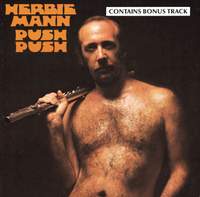Classic Recordings,
Herbie Mann - Push Push

Jazz flautist Herbie Mann is a player best known for his series of commercially successful albums in the sixties, which combined crossover appeal and genre experimentation. Growing up he also learned tenor saxophone and clarinet, but he was one of the first jazz musicians to popularise the flute as a leading instrument, appearing on various bop recordings throughout the 50’s, and was the session flautist on 1954’s Sarah Vaughan with Clifford Brown. Towards the end of his early period, Mann became interested in integrating the sounds of world music into jazz, with albums like Flautista! credited with popularising the sound of bossa nova in American jazz. Though he had fairly traditional beginnings, mentions of jazz flautist Herbie Mann aren’t always so favourable, due to his explorations in popular music and ‘abandoning’ of traditional jazz approaches, with some critics claiming he would simply jump onto trends for quick success; Mann’s perceived pivot into the mainstream was met with criticism of him ‘selling out’. Indeed, one of his best-selling hits, ‘Hijack’, is a dancehall-ready funk tune, from the aptly titled record Discothèque - a far cry from the sounds of his early career.
In a similar vein, Push Push is one of the many albums in Mann’s discography that takes much of its inspiration from the contemporary sounds of funk and R&B music, as well as Southern rock by the presence of session guitarist Duane Allman, who takes the majority of guitar solos on this album. It was also one of the first albums released on Mann’s own label, Embryo, which would put out albums from Mann himself as well as the likes of Ron Carter and jazz-rock band Air. A direct follow-on from soul-influenced records like Memphis Two-Step and Muscle Shoals Nitty Gritty, Push Push dives headfirst into the funky, soulful sounds of the 1970’s. The title track gives us a pretty accurate teaser of the rest of the tunes on the album; rather than featuring the harmonic zig-zagging of his older bop recordings, ‘Push Push’ jams on over the same four bars for its ten-minute runtime, the tune itself carried by Mann and Allman’s swaggering solos. This is the case with much of the material on Push Push - the following track, an interpretation of Marvin Gaye’s ‘What’s Going On’, features mostly improvisation around a loosely constructed version of the original tune.
While we’re on the topic of improvisation, Duane Allman’s buttery-smooth solos are a much welcome addition to the ensemble. Released only a few months before his unfortunate passing at 24 years old, Allman spent much of his time dropping in to recording sessions and laying down a solo on whatever was being taped that day. It’s a reason his music is supposedly so hard to properly catalogue, as unlike on Push Push, many of these guest spots would go uncredited. His distinctive Southern blues-influenced slide technique is all over this album, melding well with the funk-rock textures of Mann’s two other rhythm guitarists, Cornell Dupree and David Spinozza. The reaction from hardcore jazzers to this ‘new’ Mann sound is understandable - at points it crosses over so far it’s hardly able to be called ‘jazz’ anymore.
Mann considers Push Push and 1968’s Memphis Underground the ‘epitome’ of his approach to music, citing the tightness of his rhythm section; with music that edges so close to funk as this, rhythm is key. It’s perhaps a testament to this approach that the seven tracks - with barely a chord progression between them - still rock pretty hard. As music critic George Kanzler noted, while Miles Davis’ forays into funk rock were often praised by contemporary critics, Mann’s legacy is often that of a ‘sellout’, unfairly robbing him of his status as an innovator. I think it’s time we gave Herbie Mann a break and appreciate him for his strengths.



